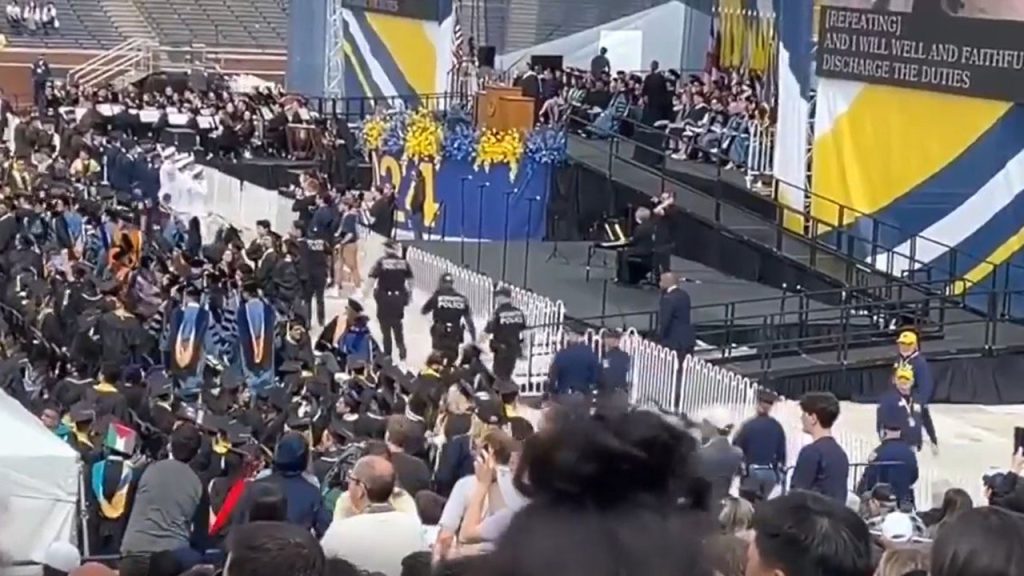During a commencement ceremony at the University of Michigan, anti-Israel protesters disrupted the event by chanting antisemitic slogans and attempting to disrupt speakers. Approximately 50 protesters displayed Palestinian flags and yelled during the ceremony, including while U.S. Secretary of the Navy Carlos Del Toro was speaking. The protesters were met with boos from the audience, and law enforcement moved them to the back of the stadium. Some protesters wore keffiyehs, a symbolic Palestinian clothing item. The disruptive behavior caused chaos and made it difficult for attendees to hear the speakers.
Graduate Benny Shaevsky expressed his frustration with the protesters, noting that he had to be moved to a different seat in order to hear the speakers due to the disruptive chanting. While he called for the protesters to leave, he did not witness any arrests taking place. The University of Michigan has announced restrictions on disruptive behavior at events, including a ban on obstruction of sightlines and the display of banners or flags that could disrupt the event. Shaevsky expressed concern over the impact of the protests on his campus, noting that the disruptions have been ongoing for months and have intensified in recent weeks.
Shaevsky, who had long dreamed of graduating from the University of Michigan, was emotional about the disruption of the ceremony that he had looked forward to. The protests at the University of Michigan were part of a larger trend of anti-Israel demonstrations at universities across the country, including clashes between demonstrators and law enforcement. While the university has stated that it respects free speech, Shaevsky believes that stronger measures need to be taken to address disruptive behavior on campus. He emphasized the importance of allowing free speech but noted that there are appropriate times, places, and manners for expressing dissent. In this case, the disruption of the commencement ceremony was not an appropriate forum for protest.
The growing trend of anti-Israel protests on college campuses has led to increased tensions between protesters and authorities. At the University of Michigan, efforts are being made to de-escalate disruptions and maintain decorum during events like commencement ceremonies. Despite the university’s commitment to free speech, there are concerns about the impact of protests on the campus community. Shaevsky’s experience at the disrupted graduation ceremony highlights the challenges of balancing free speech with maintaining order and respect for others. Moving forward, there may be a need for more proactive measures to address disruptive behavior and uphold the values of the university community.
In the wake of the disruptions at the University of Michigan’s commencement ceremony, there is ongoing debate about the appropriate boundaries for protest and free speech on college campuses. While protesters have a right to express their views, there are concerns about the impact of disruptive behavior on events like graduation ceremonies. Shaevsky’s experience of having his long-awaited graduation ceremony disrupted by protesters illustrates the challenges of navigating free speech and maintaining order on campus. As universities grapple with how to address these tensions effectively, there may be a need for clearer guidelines and enforcement mechanisms to ensure that events can proceed without interference.













